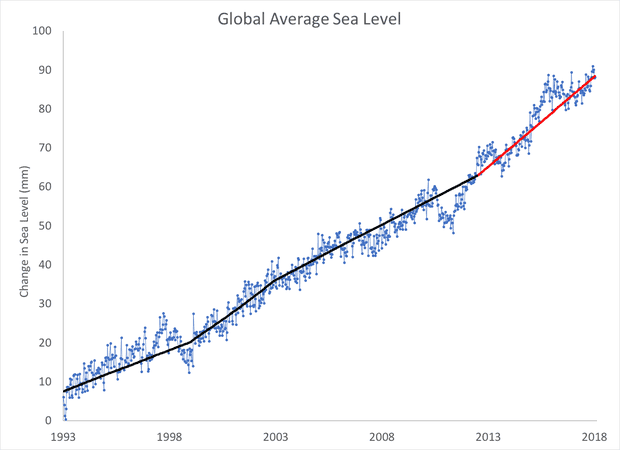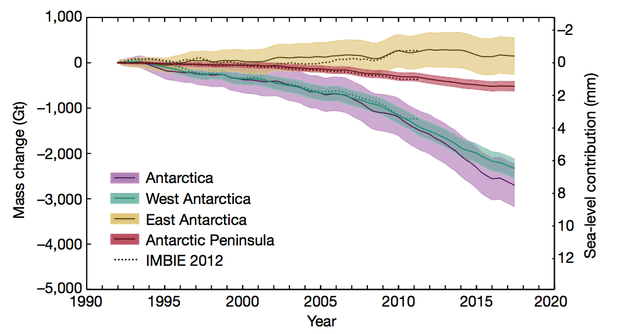Should we be worried about surging Antarctic ice melt and sea level rise?
Posted on 18 June 2018 by dana1981
There’s recently been a spate of sea level rise denial in the conservative media, but in reality, sea level rise is accelerating and melting ice is playing an increasingly large role. In the first half of the 20th Century, average global sea level rose by about 1.4 millimeters per year (mm/yr). Since 1993, that rate has more than doubled to 3.2 mm/yr. And since 2012, it’s jumped to 4.5 mm/yr.

Global mean sea level data from the Colorado University Sea Level Research Group, with 4-to-5-year linear trends shown in black and red. Illustration: Dana Nuccitelli
Thermal expansion (ocean water expanding as it warms) continues to play the biggest role in sea level rise, but its contribution of about 1.3 mm/yr is now responsible for a smaller proportion of total sea level rise (30% in recent years) than its contribution since the 1990s (40% of the total). That’s because of the acceleration in melting ice.
Glacier melt is accelerating, recently contributing about 0.75 mm/yr to sea level rise, up from 0.65 mm/yr since the 1990s. But the biggest jumps have come from ice in Greenland and Antarctica. Greenland had been responsible for about 0.48 mm/yr sea level rise since 1990, but in recent years is up to 0.78 mm/yr. A recent study in Nature Climate Change found that Greenland contributed about 5% to sea level rise in 1993 and 25% in 2014.
Antarctica is a huge question mark with warning signs
Another recent paper published in Earth’s Future found that rapid losses from Antarctic ice are plausible. The study found that in moderate to high carbon-emission scenarios, an average expected sea level rise of 2 to 2.5 feet by 2100 could actually become 3 to 5 feet once Antarctic ice sheet dynamics are taken into account.
The vast majority of Antarctica’s current ice loss is coming from West Antarctica, where about 75% of the glaciers are located below sea level. In East Antarctica, which has so far remained stable, only about 35% of the glaciers are below sea level. Warming ocean waters are melting the Antarctic ice from below, which is particularly problematic for that low-lying ice in West Antarctica. Research suggests that the collapse of the Western Antarctic ice sheet is already unstoppable.

The amount of ice loss across Antarctica in total (purple), and in West Antarctica (green), East Antarctica (yellow) and the Antarctic Peninsula (red). Illustration: Shepherd et al. (2018), Nature
Should we be worried?
Short-term variations in sea level rise do happen. Sea level actually briefly fell in 2010 due to a strong La Niña cycle, which typically results in an increase of rain and snow falling over land. This resulted in a number of epic deluges and flooding across the globe; more water on land temporarily meant less in the ocean.
However, Antarctica and Greenland could potentially cause rapid sea level rise. As James Hansen explains in the video below, there have been periods in the not-so-distant past when sea levels rose at an average rate of 1 meter every 20 years.































 Arguments
Arguments






























Great video. So meltwater pulse 1a caused approximately 20 metres total sea level rise over approx. 500 years, that is approx. 4 metres per century! J Hansen is rightly screaming at us to pay attention to this. People would have to be asleep not to see the urgent significance.
It's associated with a period of abrupt warming of approximately 5 degrees celsius, that happened somewhere over a period of a few decades to a couple of centuries.
There are two competing theories of the origins of the meltwater. Firstly its could have been caused by ice sheet collapse over North America, and theres good evidence for this, but this only accounts for about half of sea level rise. Secondly theres very good evidence collapse of ice sheets in the Antarctic accounts for at least the other half, which would be approx. 2 metres per century. So imho maybe its a combination of both events.
So the bottom line is theres virtually no doubt that sea level rise has been rapid in the past, so ice sheets can destabilise quickly.
Modern warming is rapid, and could hit 5 degrees celsius by 2100 so is not dissimilar to rates during mwp 1a. We already have recent evidence that melting is accelerating in the antarctic. It just all suggests 2 metres sea level rise by 2100 is very plausible, and probably likely, and you could not rule out more. I don't think it would be exponential acceleration but it would be getting close. This would be devastating, and would totally reshape the planet's coast lines, and would clearly go on for centuries.
Related material: Flooding from sea level rise threatens over 300,000 US coastal homes – study. Climate change study predicts ‘staggering impact’ of swelling oceans on coastal communities within next 30 years.
10 meters would flood New York City and most of Florida.
(scratches chin)
Is there some way to speed this up?
Hmm, while accelarating sealevel rise is undoubtedly a worry, it is also worth noting that at time of meltwater pulse a1, there was a great deal more ice to contribute to it and it was in higher latitudes. On other hand, rate of warming is much higher. Still, say 5cm of ice melting off a millions of sq km of ice is probably still a lot more water than 20cm of melt from a thousands of sq km. The higher latitude also means the albedo feedback is more significant.
Scaddenp @4 yes there's not as much area of ice now in N America or continental Europe, but about half of the sea level rise of mwp 1a appears to be from Antarctica, and that area hasn't changed much.
It just looks like theres the potential for breakup of Antarctica to add more to sea level rise than we thought. It looks like Antarctica added 2M per century during mwp 1a, so even if we assumed it added only half that to current global estimates, that would still be huge.
J Hansen proposes that much higher numbers are possible, and must have his reasons but I confess I haven't read the details of what he says.
Very interesting article; very concerning.
Quick question: If I add up the individual contributors (data since 2012), I don't get the total, what is the missing component? Or are my numbers wrong?
Contributors: Warming (1.3mm), Glaciers (0.75), Greenland (0.78), Antarctica (0.6) ... Sum of contributors (3.43mm) ... Total given in article (4.5mm). ... Thanks!
The main problem could be a simple physical fact. At pressure the melting point of ice is depressed. At present, the deep, circumpolar water is flowing down the retrograde slopes of Gaciers such as Pine Island and Thwaites and melting ice at the grounding line. This water is warmer than it used to be. However, even if we managed to halt this process and the circumpolar water went back to its pre industrial temperature, the suppression of the melting point of ice at the grounding line would likely cause the retreat of these glaciers to continue. The water, which is a mix of the salty water flowing down the slope and melted ice, flows up the ice ceiling and is super cooled with respect to the shallower depths. Ice is deposited on the underside of the floating ice but this ice is lost to the ocean every year or so. Since we are extremely unlikely to reverse our output of CO2 any time soon, we are in double trouble as the circumpolar deep water keeps getting warmer.
William, you are very well informed, but I'm a bit unclear on that. My understanding is warm oceans are melting the ice shelf that sits around the edge of the glaciers, and this would cause glaciers to move more quickly towards the oceans. Are you saying with the ice shelf gone, even if the oceans were cold, this would cause the face of the glaciers to retreat? Or what?
As this is your first post, Skeptical Science respectfully reminds you to please follow our comments policy. Thank You!
Dana
what is the reference for the second figure? I have a copy of Shepherd 2018 Nature and it does not have this figure.
thank you
Tony Noerpel
Tony, the figure is Fig 2 of Shepherd 2018 "Mass balance of the Antarctic Ice Sheet from 1992 to 2017".
Or here for open version.
Scaddenp
thanks so much. I have a subscription to nature but searched for Shepherd in the author querry.